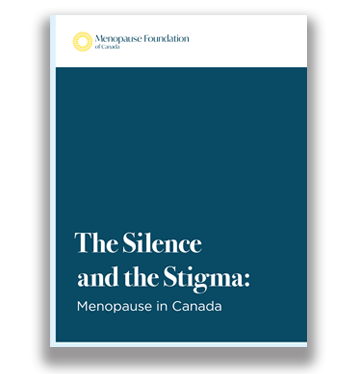The Silence and the Stigma: Menopause in Canada
The Menopause Foundation of Canada released a landmark national research report on October 6, 2022, revealing the steep toll of silence and stigma on Canadian women as they go through menopause.

Menopause Foundation of Canada Media Release:

New national research report on menopause reveals the steep toll of silence and stigma on Canadian women
Menopause Foundation of Canada report shows women in the prime of their lives facing inequity in the healthcare system and at work; calls for action
TORONTO, October 6, 2022 – Landmark new research of Canadian women going through the universal experience of perimenopause / menopause reveals the real-life impact and inequities women face in a stage of life long shrouded by secrecy. A shocking one in two (46%) feel unprepared for this stage of life and, in a world where no topic is off limits, more than half (54%) believe menopause is still a taboo subject. Despite menopause affecting 50% of the population, a remarkable four in 10 women in the national survey by the Menopause Foundation of Canada (MFC) reported feeling alone through their menopause experience.
The Menopause Knowledge Gap
The silence around menopause leaves too many of the estimated 10 million women in Canada over the age of 40[i] – those in perimenopause/menopause/postmenopause – searching for answers. They are trying to understand what is happening to their bodies, why they may be feeling the way they do, and whether treatment and support is available. It also leaves women unaware of the potential long-term health impacts of menopause.
Most women – 95% in MFC’s survey – experience menopausal symptoms. While the majority of women were aware of hot flashes (84%) and night sweats (77%), two-thirds or more were not aware that urinary tract infections (82%) and heart palpitations (75%) were symptoms. Six in 10 did not know that headaches/migraines (58%), anxiety (58%), depression (56%) and memory issues (58%) were symptoms. Complicating the issue is determining whether these symptoms are the result of another condition.
“I have been treating menopausal women for decades and know the serious toll symptoms can have on their health and quality of life,” said Dr. Wendy Wolfman, MD, FRCS(C), FACOG, NCMP, president of the Canadian Menopause Society and a member of the Medical Advisory Board of the Menopause Foundation of Canada. “Menopause is seen as something women must endure, like a woman’s burden. This is unacceptable. Women deserve to feel healthy and they should not suffer in silence. There is preventative care, lifestyle choices, and safe and effective treatment options to help women thrive during their menopausal years.”
Health Equity
The average Canadian woman will spend up to half of her life in a menopausal state. While women report their family physicians are their most trusted source for information and advice about menopause, fewer than one-quarter said their family physician proactively discussed menopause with them. Of the 41% who decided to seek out medical advice themselves, 72% found that advice to be not helpful or only somewhat helpful, and four in 10 women felt their symptoms were undertreated.
“The hormonal changes associated with the onset of menopause can increase the risk for osteoporosis, heart disease and many genitourinary issues that can get worse over time if not managed appropriately,” said Dr. Shafeena Premji, CCFP, MHA, BSc, MCMP, who operates a menopause and women’s health clinics in Alberta. “It is critical that family physicians deepen their understanding of menopause, including learning about the latest clinical practice guidelines, and proactively starting the menopause conversation with their patients.”

Menopause Inclusive Workplaces
An estimated one-quarter – five million – of Canada’s 19-million-person labour force are women over the age of 40.[i] MFC’s new research reveals that three-quarters of working women feel their employer is not supportive or do not know if they have support to help them manage this stage of life. Eighty-seven per cent of survey respondents believe working women need support through all stages of life, including menopause. Working women going through menopause are also dealing with the reality of ageism, with 3 in 10 fearing that their colleagues may see them as weak, old, or past their prime.
“Women in the prime of their lives should not be blindsided by menopause,” said Janet Ko, president and co-founder of The Menopause Foundation of Canada. “Normalizing this natural part of life is long overdue and everyone has a role to play. Our hope is that by talking about menopause we break the taboo and empower women with evidence-based information. Improving health equity for women during this time of life and making sure that our workplaces are age and gender inclusive will go a long way towards ending the silence and the stigma of menopause.”
About the report – The Silence and the Stigma: Menopause in Canada
The survey was conducted by Leger Canada between August 2 and August 11, 2022, using Leger’s online panel. The survey of 1,023 Canadian women aged 40-60 is representative by region, education, income, and ethnicity among women that fall into this age range. This independent research report was made possible by supporters and volunteers, including educational funding from Lupin Pharma Canada, Organon, Astellas Pharma and Searchlight Pharma.
About the Menopause Foundation of Canada
The Menopause Foundation of Canada (MFC) is a national non-profit advocacy organization created to raise awareness of the impact of menopause on women and society. MFC’s mission is to eliminate the social stigma and taboos associated with menopause and to ensure that this important women’s health issue is fully supported by our health care system, government, business and the broader community. Learn more at menopausefoundationcanada.ca
[i] Statistics Canada. Population Estimates on July 1st 2021, by age and sex. Accessed September 27, 2022.
[ii] Statistics Canada. Table 14-10-0018-01 Labour force characteristics by sex and detailed age group, annual, inactive (x 1,000) DOI: https://doi.org/10.25318/1410001801-eng



